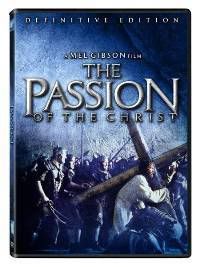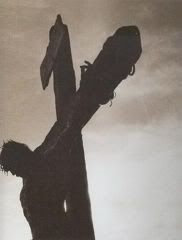"Passion:" The Definitive Edition DVD to release January 30, 2007

The Passion of the Christ is a ground breaking film that has changed countless lives by illuminating the last few hours of Christ's life and ministry on earth. The film stands as the #11 biggest films in terms of box office sales for all time and the original DVD sold over 15 million units. Now, for the first time, we bring you the incredible full story of how this film came to be in The Passion of the Christ - The Definitive Edition. Explore behind the scenes and witness the journey of the many passionate and determined individuals that worked against the odds to bring this culture-impacting film to life.
SPECIAL FEATURES
- Commentary From Mel Gibson, Theologian Father William J. Fulco, and Music Commentary by John Debney
- Includes 'By His Wounds We Are Healed: Making the Passion of the Christ' Documentary
- 'The Legacy' Feature-Commentary on the Times and Culture during the time of Christ
- Deleted Scenes
- Theatrical Trailers
- Still Picture Galleries
- And Much, Much More
Thanks to Peter Chattaway and Matt Page for the tip-off.
Further Details: Fox/MGM Home Entertainment has announced The Passion of the Christ: Definitive Edition. The two-disc special edition will be available to own from the 30th January for around $26.98. The film itself will be presented in 1.88:1 anamorphic widescreen, along with Aramaic DTS 5.1 and Dolby Digital 5.1 Surround tracks. Extras will include Passion Re-Cut (seamlessly branched), a filmmaker commentary with Mel Gibson, Caleb Deschanel, and John Wright (original cut only), a production commentary with Stephen McEveety, Ted Rae and Keith Vanderlaan (original cut only), a theologian commentary with Mel Gibson, Father William J. Fulco, Gerry Matatics, and Father John Bartunek (original cut only), and a music audio commentary with John Debney on selected scenes. Completing the package will be deleted scenes (Pilate, Don't Cry), production artwork, historical texts, a By His Wounds We Are Healed: Making the Passion of the Christ Documentary, a five-part The Legacy feature (Paths of the Journey, On Language, Anno Domini, Crucifixion: Punishment in the Ancient World, and Through the Ages), and the trailer.
A lot has happened since The Passion of The Christ came out three years ago and broke a series of records, becoming the top-grossing R-rated movie, the top-grossing foreign-language film, and the top-grossing religious movie of all time—at least in North America. (The Matrix Reloaded is still the top R-rated film worldwide.)
Major movie studios have tried to replicate its success—by setting up faith-oriented divisions like FoxFaith, or by producing entire biblical movies of their own, such as The Nativity Story—and the careers of several of the film's key players continue to reflect the film's influence. Jim Caviezel, who played Jesus, will do so again in an audio Bible for Thomas Nelson. Hristo Shopov, who played Pontius Pilate, reprised the role last year in a remake of the Italian film The Inquiry. Benedict Fitzgerald, who co-wrote the script, recently wrote a prequel of sorts called Myriam, Mother of the Christ, and sold distribution rights to the as-yet-unproduced film to MGM.
And then there is director Mel Gibson, who bucked a wave of controversy over the film's raw violence and alleged anti-Semitism, only to be caught making racist remarks shortly before finishing the similarly gory Apocalypto last year.
It will probably be a few more years before we have enough perspective to properly assess the film and its impact on our culture, but now is as good a time as any to revisit the film, and the two-disc "definitive edition" that comes out today is an illuminating place to start. It includes both the original film and the slightly shorter, slightly less violent version known as The Passion Recut; and it includes multiple audio and text commentaries, as well as hours of documentary features.
The bonus features run the gamut from the usual making-of vignettes—and yes, they do go into some detail explaining the special effects that made the flogging and the crucifying look so realistic—to more explicitly religious materials, including a virtual pilgrimage to the places in Jerusalem that mark the fourteen Stations of the Cross. Surprisingly, many of these featurettes are copyrighted 2005, which suggests the set was finished over a year ago, but was then held back for some reason.
Like the film itself, this DVD is a thoroughly Catholic affair; while evangelicals like Larry Ross and Paul Lauer are interviewed briefly to discuss the film's marketing campaign, commentary on the film itself—and on the fates of Mary and the apostles after the events of the film—tends to follow a traditional Catholic perspective.
This becomes most clear on the film's audio commentary tracks, of which there are four. Two are devoted to different sets of filmmakers, and a third is given to composer John Debney, who talks about his return to the Catholic faith and how Mary "spiritually helped me get through this film." The fourth commentary looks at the film from a strictly theological perspective, and in addition to Gibson and Fr. William J. Fulco, the Jesuit priest who translated all the dialogue into Aramaic and Latin, it includes two former Protestants: one, Fr. John Bartunek, now works sometimes as a press liaison for the Vatican, while the other, Gerry Matatics, is a radical traditionalist Catholic who rejects all the Popes for the last 40 years.
The comments they make on the film and the traditions on which the film builds are frequently insightful, and should deepen everyone's appreciation of The Passion. Ironically, however, some Protestants who have used the film as an evangelistic tool may recoil a bit when the theologians indulge in the odd bit of Catholic apologetics, explaining why they no longer believe in "sola scriptura," and so on.
If one thing comes through loud and clear, it is that Gibson may be an artistic genius but he sure isn't a scholar. There is a stunning moment in the film where Mary rushes to Jesus, after he falls under the weight of his cross, and Jesus, before pulling himself back up, tells her, "See Mother, I make all things new." This line actually comes from Revelation, not the Gospels, and its incorporation into the Gospel narrative is one of the film's many daring, and brilliant, ideas. The funny thing is, Gibson can't seem to remember where it comes from; when he says on the audio commentary that it comes from Acts, the theologians quickly correct him.
Pastors and scholars everywhere may also roll their eyes when Gibson claims, in the making-of documentary, that "the Gospels are synoptic; that means they are synopses." Actually, in biblical studies, the word means nothing of the kind. Instead, it refers to the three Gospels—Matthew, Mark and Luke—that seem to "see" the life of Jesus "together," because their contents overlap a fair bit. John, while canonical, is not a "synoptic" Gospel, because it comes from a rather different point of view—yet Gibson speaks as though all the Gospels were "synoptic." (It's all a little reminiscent of how Gibson went around last year saying that "apocalypto" means "new beginning," when in fact it is a Greek word meaning "I reveal.")
So, take everything Gibson says with a hefty grain of salt. But by all means, watch the film again (and again, and again, if you want to check out all the commentaries!) and ponder it on its own terms. It is the work of art, and not the artist's fitful attempts to explain it, that ultimately matter—and this two-disc set does its part to enrich our understanding of Gibson's flawed but breathtaking masterpiece.
© Peter T. Chattaway 2006, subject to licensing agreement with Christianity Today International. All rights reserved. Click for reprint information.





0 Comments:
Post a Comment
<< Home